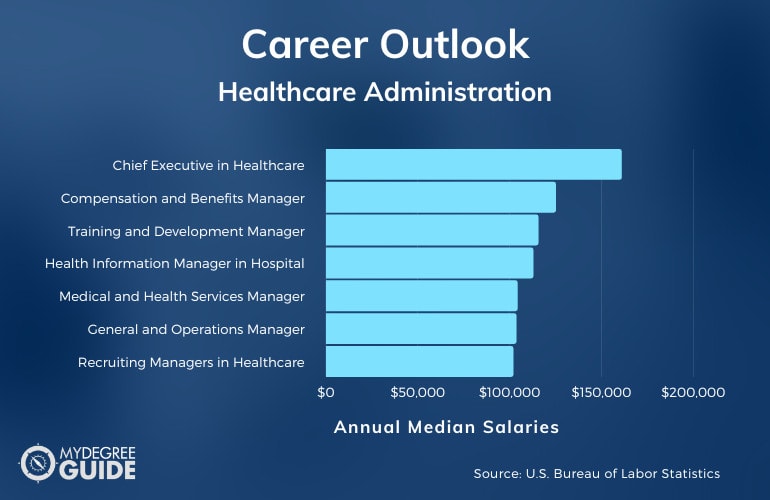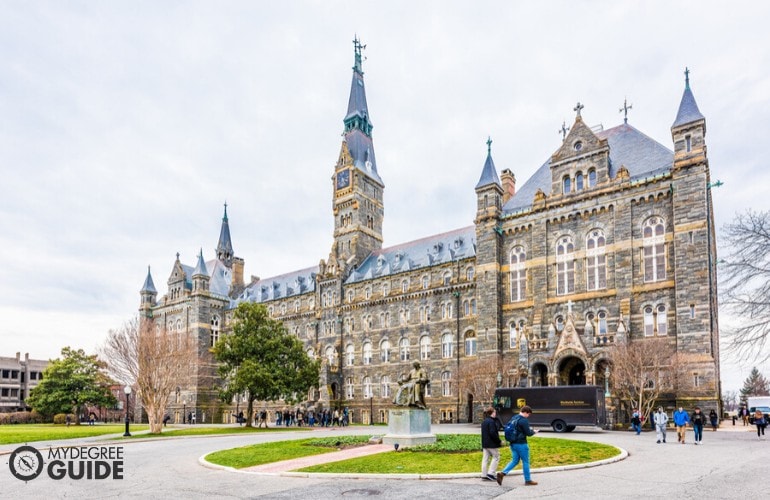Explore Online Masters in Healthcare Administration for 2024. Compare online MHA programs, schools, career options, and salaries.

Healthcare is a booming industry, and an online master’s in healthcare administration can help you gain both the skills and the credentials to be competitive in today’s job market.
You don’t even need to take classes on a college campus. Everything can be done online. The paydays can be impressive, too. The average salary is $80,000 per year, and the top earners in the industry can take home more than $100,000 per year (Center on Education and the Workforce).
Editorial Listing ShortCode:
The most lucrative jobs are in government, hospitals, physician’s offices, and outpatient care centers, but there are many other opportunities out there as well.
Universities Offering an Online Master’s in Healthcare Administration
Methodology: The following school list is in alphabetical order. To be included, a college or university must be regionally accredited and offer degree programs online or in a hybrid format.
1. Baker University
Baker University was established in 1958 as a small private postsecondary school. Over time, BU has grown to provide a variety of degree options that range from associate to doctoral And Ph. D. programs. Affiliated with the Methodist Church, Baker University has a diverse student population and academics founded in liberal arts.
Baker University is accredited by the Higher Learning Commission.
2. Bethel University
Opening in 1871, Bethel University strives to meet the spiritual and educational needs of students looking to gain an associate, bachelor’s, or postgraduate degree. BU encourages students to take part in community service projects and other volunteer options to obtain a more rounded education.
This private school also provides an e-learning option for most degree programs.
Bethel University is accredited by the Southern Association of Colleges and Schools Commission on Colleges.
3. Benedectine University
Beginning in 1887, Benedictine University is a private school the emphasizes the importance of having a positive impact on society. Offering numerous undergraduate, postgraduate, and doctoral programs, students at BU learn to be critical thinkers and humanitarians.
BU reaches students from across the nation and an array of other countries through online learning programs.
Benedictine University is accredited by the Higher Learning Commission.
4. Bryan College
Bryan College opened in 1930 as a private liberal arts college. Offering over eighty associate, bachelor’s, and master’s degree programs, BC excels in teaching content standards with a Christian worldview. BU has expanded its programs to include graduate studies, an on-campus physical therapy clinic, and a school for engineering.
Bryan College is accredited by the Southern Association of Colleges and Schools Commission on Colleges.
5. Cedarville University
As one of the topmost private Christian universities in the region by U.S. News & World Report, Cedarville University has been serving students since 1887. Offering over 140 academic programs that lead degrees that range from bachelorette to doctoral, Cedarville University surpasses curriculum expectations by preparing students for leadership in their field and service to others.
Cedarville University is accredited by the Higher Learning Commission.
6. Champlain College
Champlain College is known worldwide for its innovation and academic service that began in 1978. Awarding degrees in a multitude of program majors, students at Champlain College can earn an associate, undergraduate, postgraduate, or professional degree using a distance learning or an in-class format.
This private school prides itself on meeting the needs of all students.
Champlain College is accredited by the New England Commission of Higher Education.
7. Colorado Christian University
Opening in 1914, Colorado Christian University Provides students with numerous program options that can lead to an associate’s, undergraduate, or postgraduate degree that teaches more than core content knowledge.
Students at CCU are provided with a private, faith-based education that includes compassion, diversity, and leadership skills in all programs.
Colorado Christian University is accredited by The Higher Learning Commission.
8. Eastern University
Opening in 1925, Eastern University has over 160 graduate and undergraduate degree programs to assist students in obtaining academic and personal success. This private school incorporates an inclusive community that seeks a faith-based college curriculum option.
Eastern University offers an accelerated program for students looking for early graduation options with the same rigorous content.
Eastern University is accredited by the Middle States Commission on Higher Education.
9. Gwynedd Mercy University
Beginning as a junior college in 1948, Gwynedd Mercy University has expanded to become a respected private college that is affiliated with the Catholic Church.
GMU has a diverse student population of all faiths that seek to engage in critical thinking and research studies to receive an undergraduate or graduate degree in one of more than forty academic majors.
Gwynedd Mercy University is accredited by the Middle States Commission on Higher Education.
10. Lamar University
1923 marks the beginning of Lamar University, which merged into the Texas University system in 1995. This public, academic facility has more than 100-degree programs at all levels of degrees, ranging from associate through doctoral education.
Thousands of students turn toward Lamar University every year to obtain their professional and impersonal goals.
Lamar University is accredited by the Southern Association of Colleges and Schools Commission on Colleges.
11. Limestone University
Limestone University opened in 1845 as one of the first women’s colleges in the nation. This private, Christian college accepts students of all denominations and genders and grounds all programs with a liberal arts foundation. With more than fifty program majors, Limestone College gives students numerous options for an undergraduate and graduate degree.
Limestone University is accredited by the Commission on Colleges of the Southern Association of Colleges and Schools.
12. Maryville University
Maryville University is accredited by The Higher Learning Commission.
13. Midway University
Midway University is a private, liberal arts academic facility that started in 1847. Students enrolled at Midway University have the opportunity to gain an undergraduate or graduate degree. MU offers a plethora of on-campus and virtual learning opportunities.
Students at MU have access to accelerated eight-week classes that allow them to obtain their degree in a faster, more flexible way.
Midway University is accredited by the Southern Association of Colleges and Schools, Commission on Colleges.
14. Oklahoma City University
Oklahoma City University is a private Methodist university that began in 1904. OCU offers seventy undergraduate options, twenty graduate degree options, and law and PH.D. programs to a diverse student population.
Serving almost 3000 students, popular programs at OCU include business, healthcare, education, nursing, and technology. Online and classroom programs are available in most academic programs.
Oklahoma City University is accredited by the Higher Learning Commission of the North Central Association.
15. Rivier University
Rivier University was established in 1933 as a private liberal arts school. It is affiliated with the Catholic Church, and its core values include providing an inclusive, caring environment.
Rivier University sits on a six-eight-acre suburban campus where students can earn a variety of undergraduate and graduate degrees, including professional studies. Degree options are also provided through distance learning.
Rivier is accredited by the New England Association of Schools and Colleges, Inc.
16. Saint Joseph’s University
Following the Jesuit culture, Saint Joseph University has been offering working adults a chance to achieve professional and personal growth since 1851.
Saint Joseph University is a private postsecondary school that has a range of degree options from have undergraduate to professional programs. SJU brings research and technology to all programs offered.
Saint Joseph’s University is accredited by the Middle States Association of Colleges and Schools.
17. South University
Opening in 1899, South University provides students with the ability to acquire any level of degree, ranging from an associate to doctoral. This private university takes pride in the ability to offer a small student to teacher ratio, both in a classroom and online.
SU encourages all students to take part in community service projects to gain a more rounded education.
South University is accredited by the Southern Association of Colleges and Schools Commission on Colleges.
18. Southeast Missouri State University
Working with students throughout the globe who are looking to pursue an undergraduate, graduate, or doctoral education is a specialty at Southeast Missouri State University.
Since its opening in 1873, SMSU has worked tirelessly to become a public education option that gives students the flexibility to achieve their dreams. SMSU has a variety of hybrid, online, and campus classrooms.
Southeast Missouri State University is accredited by the Higher Learning Commission.
19. Southeastern University
Opening as a private Christian school in 1935, over time, Southeastern University relocated to Lakeland, FL, and is home to about 7000 students annually.
SU has more than fifty bachelor’s degrees, sixteen master’s degrees, and two doctoral programs in an array of academic majors. It also has a variety of program options that allow students to gain their degrees entirely online.
Southeastern University is accredited by the Southern Association of Colleges and Schools Commission on Colleges.
20. Southern Oregon University
Southern Oregon University opened as a public school in 1872 and now has seven academic divisions to serves almost 6500 students annually. Students enrolled at SOU can choose from more than ninety undergraduate, graduate, and professional programs.
Most SOU courses are completed in ten-weeks, and the academic calendar runs off the quarter system.
Southern Oregon University is accredited by the Northwest Commission on Colleges and Universities.
21. Southern Wesleyan University
Based on Christian beliefs of serving others, Southern Wesleyan opened as a private school in 1906. Located on a beautiful campus in SC, SWU gives students multiple ways of obtaining a two-year, four-year, or postgraduate degree. Along with on-campus classrooms, SWU offers online, evening, and hybrid, classes for most program options.
Southern Wesleyan University is accredited by the Southern Association of Colleges and Schools Commission on Colleges.
22. Spring Arbor University
Spring Arbor University was founded in 1872 and has since expanded into one of the most esteemed private schools in the state. SAU blends spirituality with rigorous core content to help students receive a well-rounded undergraduate or graduate degree in a variety of academic majors. Spring Arbor University has both online and in-class options.
SAU is accredited by the Higher Learning Commission.
23. Texas A&M University-Corpus Christi
Texas A&M University-Corpus Christi is a public university that opens in 1947. It has twenty-five graduate degrees, thirty-three undergraduate degrees, and five doctoral programs across five schools that include liberal arts, business, education, science and engineering, and nursing.
TA&MU-CC works with students worldwide to help integrate them into higher learning opportunities using English as a second language.
Texas A&M University-Corpus Christi is accredited by the Southern Association of Colleges and Schools Commission on Colleges.
24. Texas Woman’s University
Texas Woman’s University started educating women in 1901. With time, experience, and growth, TWU is now a public co-ed that grants bachelor’s, master’s, and doctoral degrees in a multitude of academic disciplines. Students at TWU have the opportunity to take part in a dynamic campus environment or through distance learning options.
Texas Woman’s University is accredited by the Southern Association of Colleges and Schools Commission on Colleges.
25. Touro University Worldwide
Touro University is one of the oldest private educational facilities in the nation. The founders of TU were inspired by George Washington and open a school in 1790.
Over time TU has expanded to include Touro University Worldwide, which gives students a faith-based learning curriculum that leads to an undergraduate or graduate degree and can be accessed through an online platform.
Touro University Worldwide is accredited by the WASC Senior College and University Commission.
26. University of Louisiana – Lafayette
The University of Louisiana – Lafayette is the second-largest public college in LA , serving almost 17,000 students annually. The school was founded in 1898 and now offers undergraduate, graduate, and doctoral programs in an array of disciplines, including the only Ph.D. in francophone studies found in the state.
The University of Louisiana Lafayette is accredited by the Southern Association of Colleges and Schools Commission on Colleges.
27. University of Massachusetts – Global
The University of Massachusetts Global has been providing a private education since 1958 to students who wish to receive personal and educational growth. At UMass Global, students can earn a two-year associate degree, an undergraduate or graduate degree, or a doctoral-level education. Popular programs at UMass Global include health care, technology, and education.
The University of Massachusetts Global is accredited by the WSCUC Senior College and University Commission.
28. University of Southern Indiana
The University of Southern Indiana offers students more than 130 programs of study that allow students to obtain an undergraduate, graduate, and doctoral degree. Surpassing its humble beginning in 1965 as a small public school, UIS now reaches students across the US and into more than sixty other counties.
The University of Southern Indiana is accredited by the Higher Learning Commission.
29. University of Texas – Rio Grande Valley
Established in 2013, the University of Texas – Rio Grande Valley offers public education to students hoping to gain an undergraduate or postgraduate degree. UT-Rio Grande Valley has a diverse population and enrolls over 29,000 students every year on six campuses, a medical school, and through an online learning platform.
UTRGV is accredited by the Southern Association of Colleges and Schools Commission on Colleges.
30. Valdosta State University
Opening in 1906 as a public educational institution, Valdosta State University reaches students all over the US and seventy-six other counties.
Offering course students in hundreds of academic majors, Valdosta State has a path to any level of degree ranging from associate to doctoral. Popular courses include business, social work, education, and healthcare.
Valdosta State University is accredited by the Southern Association of Colleges and Schools Commission on Colleges.
Online Masters in Healthcare Administration Degrees
A master’s in healthcare administration is a flexible, wide-ranging degree that can prepare you for a variety of jobs.
Click on the field that most interests you to jump to that section of the guide:
You don’t have to earn a master’s degree to succeed, but it can improve your odds of landing a job, and it can give you the academic background that you’ll need to qualify for special titles and licenses.
Here are the most common online healthcare administration degree types that you’ll see in graduate-level programs.
Master’s in Healthcare Administration

A master of healthcare administration (MHA) is focused on the behind-the-scenes work of running a hospital or clinic. From handling insurance claims to hiring new staff, it’s the kind of labor that keeps a healthcare center going.
Degree programs usually offer an all-around education in things like administration, finance, policy, documentation, and technology. There might also be optional electives for things like ethics or digital informatics.
Editorial Listing ShortCode:
MHA online programs can be 100 percent virtual, or they can have face-to-face requirements in the form of internships or field practicum.
Master’s in Healthcare Management

A master of healthcare management (MHM) is very similar to one in healthcare administration, and some colleges use the terms interchangeably. You might also find it as a specialization for a Master of Business Administration (MBA) degree.
When looking at the specifics, however, there are some things that make a healthcare management degree unique. For example, it’s usually focused more on the “big picture” needs of a hospital rather than its day-to-day operations.
Editorial Listing ShortCode:
There’s often an emphasis on leadership as well; the assumption is that students will want to serve as managers, supervisors, or senior administrators. Classes can include everything from organizational behavior to human resources management.
If you aren’t sure how your chosen school distinguishes between an MHA, MHM, and MBA, don’t be afraid to ask.
Master’s in Healthcare Administration Curriculum & Courses

What classes can you expect to take while obtaining a master’s degree in healthcare administration? While every school is different, the fundamentals are similar enough to get a basic idea of what you’ll be studying. Here are some common courses you may take:
- Information Systems – Also known as “informatics” or “health information technology,” these classes teach how to navigate digital systems for modern-day health clinics. They can be complex webs of records, networks, and financial files.
- Decision Management – You’ll need to make strategic decisions as a healthcare administrator. To do that, you might want to familiarize yourself with things like risk management and organizational approaches to problem-solving.
- Finance – These courses cover subjects like accounting, auditing, budgeting, and insurance underwriting. They might be general “financial management” courses, or they might teach specialized skills for niche careers.
- Economics – It’s common for MHA/MHM programs to have an economics requirement. You might be allowed to waive it if you’ve already completed related courses on the baccalaureate level.
- Global or International Studies – Healthcare delivery is increasingly global, and there are unique challenges associated with the research and administration of intersecting countries.
- Marketing – Graduate-level marketing courses dive deep into things like consumer behavior and promotional development. If you’re interested in the advertising sector of the healthcare industry, they can teach you valuable skills in media, communications, publishing, and publicizing.
- Law, Policy, and Ethics – You should expect to spend a lot of time on healthcare law. It’s a relevant topic to just about every specialty and sub-specialty in MHA programs.
- Data Analytics – From bills to medical records, you’ll have to know how to juggle a lot of data as a healthcare administrator, and you might be asked at various times to gather, organize, analyze, present, or track it.
- Leadership – If you have your eye on a managerial position, classes in risk management, organizational behavior, and strategic planning can prepare you for the rigors of leadership.
- Capstone – Many master’s degree programs have a capstone requirement in your final year. This could include writing, researching, or even practicing in a real healthcare setting. You might be asked to fulfill in-person requirements through a residency or practicum.
Again, it’s important to check with your college to get specifics. Some will require specific classes; others will allow you to choose your own classes within specific categories and credit requirements. Some universities do both.
Healthcare Administration Careers & Salaries

According to the Bureau of Labor Statistics, the average wage for a master’s degree holder in the medical and health services management field is about $104,280 per year.
However, that’s just an average. Salaries can be more or less depending on the specific job that you have, and there are always fluctuations depending on things like experience, location, credentials, and overall job demand.
Some careers in the healthcare administration field include:
| Careers | Annual Median Salary |
| Chief Executive in Healthcare | $160,950 |
| Compensation and Benefits Manager | $125,130 |
| Training and Development Manager | $115,640 |
| Health Information Manager in Hospital | $112,870 |
| Medical and Health Services Manager | $104,280 |
| General and Operations Manager | $103,650 |
| Recruiting Managers in Healthcare | $101,990 |
| Administrative Services Manager | $98,890 |
| Nursing Home Administrator | $89,880 |
| Social and Community Service Manager | $69,600 |
Just keep in mind that these numbers can change depending on what you do and where you do it.
Choosing an Online Masters in Healthcare Administration Degree

Everyone has their own opinions about the best graduate programs for healthcare administration. However, there are a few things that high-quality degree programs have in common, and you can look for these staples as you compare and contrast colleges.
- Accreditation – The college should be regionally or nationally accredited. That’s standard. Programmatic accreditation is lesser-known, so it doesn’t have to be a deal-breaker if your MHA program lacks it, but it’s certainly a bonus if you can find it.
- Degrees and specialties – Does the school offer a master of healthcare administration (MHA) or a master of healthcare management (MHM)? Does it have any degree concentrations for things like accounting, marketing, human resources, information systems, or administrative policy?
- Fieldwork requirements – If you’re looking for a degree program that’s completely online, check its course requirements and make sure that it doesn’t ask for practicums or internships.
- Tuition – This is an important consideration for any degree, but it can especially critical on the graduate level. Look at the number of required credits and how much that they’ll cost you over time.
It isn’t easy to choose a college for your MHA/MHM. At the end of the day, however, it’s a decision that only you can make. Look at your options; figure out your priorities. Choose a school that you believe will benefit your future.
MHA Admissions Requirements

Admission to a graduate program isn’t like admission to an undergraduate program. There are more hoops to jump through, and since space can be limited, there’s fiercer competition among applicants. Here are just a few things that you’ll need to stand out from the crowd.
- GPA – Many graduate programs have a minimum GPA requirement. There might be some wiggle room depending on the other factors of your application.
- Test scores – In addition to your undergraduate transcripts, most graduate schools will require Graduate Record Examinations (GRE) or Graduate Management Admission Test (GMAT) scores.
- Resume or CV – This is the place to list your work history, life experience, military experience, scholastic research, volunteerism, and anything else that might sell yourself as a deserving applicant.
- Letters of recommendation – Depending on the university, they might want anywhere from 1 – 3 letters of recommendation from trusted sources.
- Letter of intent – This is basically your college application essay. Why do you want to study healthcare administration? What are your plans, goals, and career ambitions? What are you hoping to get out of the MHA program?
There could be additional requirements from your college if you’re a transfer student. For example, there are usually limits to the total number of credits that you can bring on, and they might only be transferable as electives rather than degree-specific requirements.
Accreditation

Accreditation is a process that colleges can undertake to prove their educational values and standards. It’s voluntary, but the vast majority of schools choose to do it, and there are consequences for students who decide to attend an unaccredited school. For example, they won’t qualify for federal financial aid like FAFSA.
There are three types of accreditation that you should know.
- Regional accreditation is given to public and private universities in different regions of the United States. For example, there’s the New England Commission of Higher Education for states like Connecticut and Rhode Island, and there’s the Southern Association of Colleges and Schools Commission on Colleges for states like Tennessee and Texas.
- National accreditation is given to trade, technical, and vocational schools. It’s also common for religious universities of all denominations. Organizations like the Association of Theological Schools offer accreditation.
- Programmatic accreditation is for specific departments and degree programs within a school. It’s usually administered by professional organizations devoted to specific careers or industries. Instead of accrediting the entire college, they’ll just accredit the relevant degree programs.
If you’re making a list of potential colleges and wondering which ones are accredited, check the Database of Accredited Postsecondary Institutions and Programs. It has a search engine where you can simply plug in the school and bring up its accreditation information.
Healthcare Administration Professional Organizations

Industry organizations are designed to help both students and working professionals. When you’re in school, they can offer educational resources and career advice.
Once you graduate, they can offer conferences, expos, job boards, networking opportunities, and product and service discounts from industry vendors.
Here are a few groups that you might be interested in as a future MHA professional.
- American Association of Healthcare Administrative Management – One of the largest and most well-known organizations for healthcare administration, the AAHAM offers everything from seminars to certification programs. If you want to become a Revenue Cycle Specialist or Certified Compliance Technician, this is the place to take the exams.
- Association of Healthcare Administrative Professional – The AHCAP has resources for members at every level of education and employment, including events, sponsorships, certifications, and continuing education classes. They even have a forum where members can chat together from all over the country.
- Health Care Administrators Association – The HCAA is for healthcare administrators of all types. They push for advocacy and education while also offering things like summits, task forces, and leadership programs for members.
Many other organizations welcome healthcare administration students, so don’t feel limited by the suggestions on this list.
For example, the American Society of Administrative Professionals (ASAP) might be a good fit for office administrators; the Healthcare Financial Management Association (HFMA) might be ideal for budgeters and auditors.
Healthcare Administration Licensing and Certification

Depending on your career goals, it might be worth the effort to get professional certificates or licenses. They’re available for many different specialties in healthcare administration.
- Certified Healthcare Financial Professional – Administered by the Healthcare Financial Management Association, the CHFP is a two-step certification that evaluates your readiness for financial challenges in the healthcare industry.
- Certified Medical Manager – Administered by the Professional Association of Health Care Office Management, the CMM is comprised of an application and exam for administrative career professionals in healthcare.
Additionally, you can earn certifications like the Certified Revenue Integrity Professional (CRIP), the Certified Compliance Technician (CCT) or the Certified Healthcare Administrative Professional (cHAP). You don’t have to be a graduate student to apply.
Financial Aid & Scholarships

A common misconception about graduate school is that you can’t get financial aid for it. While it’s true that opportunities will be more limited, it’s still possible to find and receive assistance.
The first step is filling out the Free Application for Federal Student Aid (FAFSA). You won’t qualify for subsidized loans anymore, but you can still try for unsubsidized ones, and you might get lucky with state or federal grants.
For instance, the Pell Grant is usually reserved for low-income undergrads, but exceptions can be made for graduate students under a certain income threshold as well.
You can also look for scholarships. Some are open to degree-seeking students at every level; others are designated specifically for graduate students:
- The Foster G. McGraw Graduate Student Scholarship is worth $5,000 for students who are in their final year of a graduate-level healthcare administration degree program.
- The Corris Boyd Scholars Program offers $40,000 to students of color who are pursuing master’s degrees in healthcare management.
- The Tylenol Future Care Scholarship offers between $1,000 – $10,000 for healthcare students of all types, including healthcare administration or healthcare management.
Last but not least, check with your employer. They might offer tuition reimbursement for education or certification, especially if they’re in the healthcare industry themselves. They might even have partnerships with local colleges.

What Can I Do With a Masters Degree in Healthcare Administration?
The best MHA programs will prepare you for a variety of jobs. They’ll teach you the basics of finance, business, law, and policy while also delving into specialized subjects depending on your areas of interest.
As for your job prospects, they depend on your areas of interest, too. Are you good with numbers? Become a financial director or revenue cycle specialist. Do you like working with computers? Study informatics or digital systems within the healthcare industry.
Do you want direct contact with doctors, patients, and advocates? Consider a career in human resources. The sky is the limit when it comes to the applications of an MHA. You can take it in many different directions.
Which Is Better MBA or MHA?

A master of health administration (MHA) is focused exclusively on the healthcare industry. The same goes for the master of health management (MHM). They are designed to teach real, practical business skills, but everything is filtered through a medical lens, and their goal is to prepare students for work in the healthcare field.
By contrast, a master of business administration (MBA) is a broad-spectrum business degree. Depending on your school of choice, you might be able to specialize in healthcare administration, but it won’t be the dominant focus of your studies.
Instead, you can learn general skills relating to business, finance, marketing, technology and organizational efficiency. It’ll be up to you to decide which degree is better for your career goals.
Should I Get a Masters in Healthcare Administration?

Careers in healthcare administration can be quite profitable. The top earners can reach six figures per year, and there’s a wide variety of jobs for people of all skills and interests.
According to the U.S. Bureau of Labor Statistics, it’s also an industry with high job growth rates. For example, medical and health services managers are expected to enjoy an 18 percent increase in jobs over the next decade. That translates to thousands of new positions for qualified workers, so in terms of pure, raw numbers, now is a great time to get an MHA.
So if you enjoy being in the healthcare administration field, then a MHA could be a great choice for you. If you want to go one step above an MHA, then an on-campus or online PhD in healthcare administration may be worth it as well.
How Much Does a Masters in Healthcare Administration Cost?
A master’s degree in healthcare administration can require anywhere from 30 – 60 credits to complete, and credits can range from $400 – $600 each. Tuition varies between schools depending on things like prestige, location, program length, delivery method, and more.
One thing to note is that online programs are usually cheaper than traditional programs since they can cut out a lot of campus-based student fees. However, this isn’t a guarantee.
You should also check with the school and see if there are ways to lower your tuition. In addition to financial aid, they might offer things like banded credits or full-time graduate student discounts. You can save thousands of dollars by taking advantage of these unique opportunities.
Are There Any 1 Year MHA Programs Online?

While most colleges have two- or three-year master’s programs for healthcare administration, there is a small number that offers shorter programs. It’s usually because of a combination of factors –
- Fewer required credits. If they ask for 30 or 40 credits instead of 60, students can graduate faster with a full-time course load.
- Rolling admissions. Some graduate schools allow students to enroll at any time of the year, which means that they don’t have to wait for fall or spring semesters for required classes to become available.
- Transfer credits. If you’re moving from one graduate program to another, a lot of colleges will allow you to transfer credits, especially if they’re electives.
- Flexible class options. Online degree programs might have accelerated or self-paced classes that allow students to finish the materials quickly. They might also have access to evening, weekend, or summer programs.
Speaking very generally, you can expect fast-tracked MHA programs to take between 12 – 18 months as opposed to 24 – 36 months.
Are There Any Affordable Online MHA Programs?

You don’t have to break the bank to get a master’s degree in healthcare administration. While it’s true that some of the top MHA programs can be expensive, there are plenty of financial aid opportunities to offset their costs.
Another option is simply attending another school. You don’t have to go to an ultra-elite university to get a useful and valuable degree.
How Long Does a Masters in Healthcare Administration Take to Complete?
It usually takes between 2 – 3 years to get a master’s degree in healthcare administration. However, these numbers can be shortened or lengthened depending on things like credit requirements, class availability, semester schedules, and acceleration options offered by the school.
It also matters if you’re looking at full time or part-time MHA programs.
How Much Can I Expect to Make with a MHA Degree?
The average salary for a master’s degree holder in healthcare administration is $80,000 per year (Center on Education and the Workforce).
The highest-paying occupations can reach more than $100,000 per year. As with any job, there are many factors that go into an individual person’s salary, so take these estimates with a grain of salt.
Is a Master’s in Healthcare Administration Worth it?

Yes, a master’s in healthcare administration is worth it for many students. The Bureau of Labor Statistics is projecting 15% job growth in healthcare occupations over the next 10 years. Common careers in this field include nursing home administrator, medical and health services manager, and chief executive in healthcare.
With the emergence of online colleges, it’s never been easier to get your degree, either. You can take flexible, self-paced classes with few face-to-face requirements. This makes it possible to earn an entire graduate degree from the comfort of your home.
Getting Your Masters in Healthcare Administration Degree Online

Are you an efficient, organized kind of person? Do you thrive in quick-moving business environments where there are always new challenges to overcome?
Do you feel the call of helping people in the healthcare industry? Consider getting a master’s degree in healthcare administration (MHA) if you’re ready to take your education to the next level.
